#maximized yields
Explore tagged Tumblr posts
Link
Discover how beer centrifuges are brewing up a storm in quality and innovation! 🍺✨ Dive into the world of advanced brewing technology where maximized yields, environmental responsibility, and exceptional beer taste become the norm. Ready to revolutionize your brewery? Let's explore this next-gen brewing revolution together! #BeerCentrifuges #BrewingInnovation
0 notes
Text
The same goes for such vegs. as Corn, Beans, and Squash, commonly referred to as the "Three Sisters." this agricultural trio was planted together, by the Cherokee Tribes, with each plant supporting the growth of the others: Corn provided a structure for beans to climb, Beans added nitrogen to the soil, and Squash spread out to prevent weeds. This symbiotic planting technique maximized yield and ensured soil fertility.
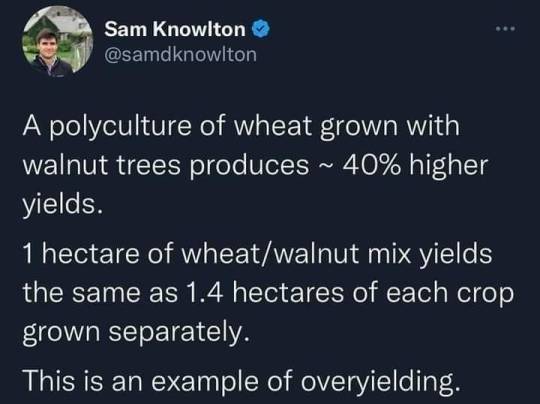
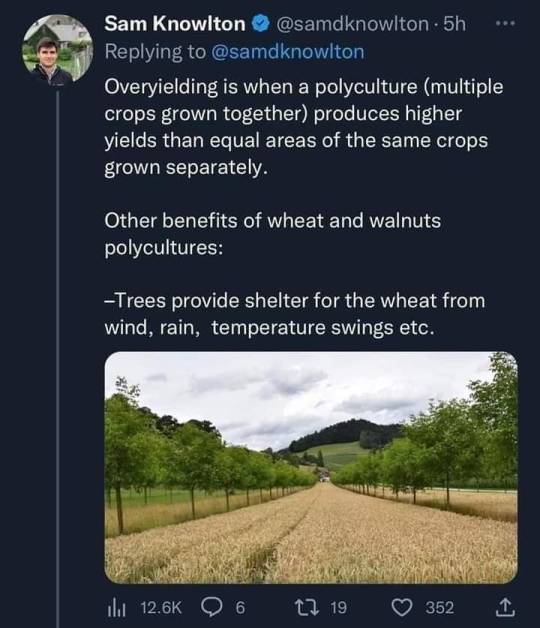
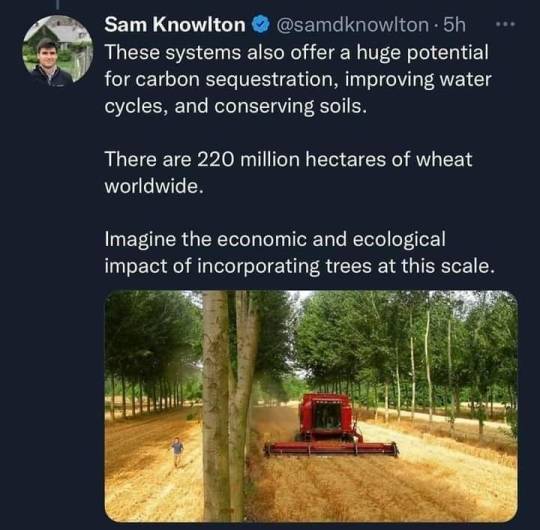
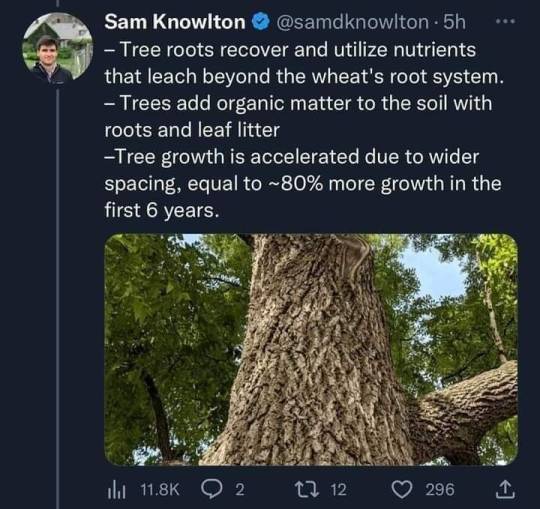
35K notes
·
View notes
Link
Discover how LED grow lights for hydroponic systems: the key to bigger yields, can transform your indoor garden into a high-producing powerhouse.
0 notes
Text
Maximize your Yield: Small Space Vegetable Gardening
In a world where green spaces are becoming increasingly limited, especially in urban landscapes, it’s more rewarding than ever to create your own mini oasis right at home. Small space vegetable gardening is your easy solution. You don��t need an expansive plot of land to grow your own nutritious vegetables. Even the most compact of spaces can become productive little vegetable gardens, serving not…

View On WordPress
0 notes
Text
Scott Pilgrim Vs. Wayne Letterkenny
Fistfight on Neutral Ground: Quebec
Who would win.
#the world isn't ready#i don't know if IM ready#i STILL need to see the new show but i wanna get home first so I can re-read my comic volumes#Maximizing the Megaton Yield that will be my hyper-fixation upon this thing
0 notes
Text

african.echo
Two Years of President Ibrahim Traore of Burkina Faso: A Report Since Assuming Leadership of the Nation 1. Burkina Faso’s GDP rose from around $18.8 billion to $22.1 billion. 2. He declined loans from the International Monetary Fund (IMF) and the World Bank, stating, “Africa doesn’t need the World Bank, IMF, Europe, or America.” 3. He cut the salaries of ministers and parliamentarians by 30% while raising civil servants’ salaries by 50%. 4. He cleared Burkina Faso’s domestic debts. 5. He established the country’s first-ever tomato processing plants. 6. In 2023, he launched a modern gold mine to strengthen local processing capacity. 7. He halted the export of unrefined gold from Burkina Faso to Europe. 8. He constructed Burkina Faso’s second cotton processing plant, adding to the single existing one. 9. He inaugurated the National Support Center for Artisanal Cotton Processing, the first of its kind, to aid local cotton farmers. 10. He prohibited the use of British legal wigs and gowns in local courts, replacing them with traditional Burkinabé attire. 11. He prioritized agriculture by distributing over 400 tractors, 239 tillers, 710 motor pumps, and 714 motorcycles to enhance production and support rural communities. 12. He facilitated access to improved seeds and other agricultural inputs to maximize farming yields. 13. Tomato production grew from 315,000 metric tonnes in 2022 to 360,000 metric tonnes in 2024. 14. Millet production increased from 907,000 metric tonnes in 2022 to 1.1 million metric tonnes in 2024. 15. Rice production rose from 280,000 metric tonnes in 2022 to 326,000 metric tonnes in 2024. 16. He banned French military operations in Burkina Faso. 17. He prohibited French media from operating in the country. 18. He expelled French troops from Burkina Faso. 19. His government is building new roads, expanding existing ones, and converting gravel roads into paved surfaces.
777 notes
·
View notes
Text
nobody puts my bald baby in a corner
Feyd-Rautha Harkonnen / Named Atreides wife A little nsfw but that's not the point. Domestic family life. They have five kids and Feyd desperately wants another. Wifey won't oblige. Don't pay attention to the other characters and Houses I included, I don't know anything about Dune and I just pulled from the fandom wiki or made them up. Their son is not the Kwisatz Haderach either!
****if you're somebody who works at tumblr hq reading this because i accidentally reported my own fic im really sorry****

It has been five years since Feyd-Rautha last saw his wife swell with his child.
It is entirely by her design, and certainly not for lack of trying. He ravages her senseless almost every night, but after five children, the ever infuriating Diana Atreides refuses to give him another. As a Bene Gesserit, it is within her power to do so; the witches are able to bend their own reproduction to their will, and Feyd-Rautha believes she likes his methods of convincing her too much to give him what he wants.
Tonight, he almost has her hooked. He kisses her knee and up her bare thigh, licking and sucking the plush skin there. She barely acknowledges him and lets him fondle her as he pleases, lost in her own thoughts.
“She’s too old for him. He’s just a boy.”
They are currently hosting several of the Great Houses. Earlier at dinner, he and Diana were approached by the Duke of Ginaz, who suggested they betroth his daughter to their oldest son, Aleksei. Diana had hidden her frown behind her glass of wine, but Feyd-Rautha had seen it and filed it away for later, thanking the Duke for his time.
He hums against her thigh, tongueing over the faint bruise he made. He can use this.
“He will be a man soon,” he reminds her. He pulls her leg over his shoulder as he shifts up the bed, now eye level with her weeping cunt. His mouth waters. “Even if we refuse this proposal, there will be others.”
He knows his wife wants to say more, but the words die in her throat when he shoves his nose against her, inhaling her scent and releasing a shaky breath. He pretends it is for her benefit, but really, this is all for him. With his fingers pulling apart the seam of her, his tongue lolls out, and Feyd-Rautha feasts.
When he has had his fill of her pleasure, he crawls up the length of her body. She pants underneath him, back arching and eyes squeezing shut like a satisfied cat, her neck exposed and vulnerable. He licks off the sweat there.
“It will not stop with Aleksei,” he says, leaning over her.
Diana scowls. She shoves him, but he does not yield. He grasps her hand, pulling it away from his chest and up to his mouth, where he kisses her fingers.
He knows he is being cruel, rubbing salt in her wound. Her children are growing. At twelve years old, Aleksei is admittedly still too young to seriously consider for marriage, but the coming years will go by in a blink. First it will be Aleksei, then Nikita shortly after, and then Maxim – although their youngest and most unstable son will be difficult to pawn off, Feyd-Rautha thinks.
His girls are another story. Sasha and Grisha were both gifted their mother’s beauty, but it is Grisha, their youngest, who takes after Feyd-Rautha the most. She is the only one of his children who did not inherit those dark Atreides curls. She is perfect; wholly Harkonnen, like her father. He knows he will feel how Diana does now when it is time for Grisha to leave his side.
It is why he fucks into his wife now, flexing his hips slowly and purposefully, so she feels every inch of his longing. He staves off the urge to empty himself inside of her prematurely, already aching to see her breasts swollen and leaking.
He stops, trying to catch his breath. He pulls back from Diana to thumb over her pearl, grinding his length into her. “Shall I leave you like this, wife?” he asks her.
“Don’t you dare,” she snaps, her hips chasing his fingers.
“I can give you what you want,” he taunts. “I will pump you full of my children happily. What is one more?”
Diana does not answer, but he sees her breaking, just as he is. He holds her legs open, jutting into the apex of them, growling as he stares her down, willing her to change her mind. She hides her fears behind her pleasure, hides the tear sliding down her cheek by turning her face into the pillow, taking what he gives her.
What is one more child? Certainly not the solution to her problem. It is only a delay of the inevitable, that one day they will all grow up and no longer need her. Feyd-Rautha knows this. But he hopes to delay his wife’s suffering, just as he will delay her gratification if she does not give him what he wants.
When he pumps his load into her, he knows she is not satisfied. He breathes through his own satisfaction, nose flaring like a bull, but she does not complain like he expected her to. She does not roll him over to claim him, or bring her fingers to her cunt to finish what he started, his eyes on her hole, full of his spend.
Instead she buries her face in her hands. Feyd-Rautha leans his weight onto her and pulls her hands away, revealing her face to him. She blinks at him, her lashes wet and clumping together.
He knows what she is feeling. “I feel it, too,” he says. “Let me give you another, my darling.”
Diana nods and looks away, breathing out a held breath. “Alright,” she says. Her eyes soften fondly when they focus on him again. “Alright.”
They lay together for a while, enjoying each other’s company. Feyd-Rautha does not know if tonight will be the night, but he hopes. He hopes she sees it the way he does -- a continuation of their happiness, not the eventual ending of it. He kisses every part of Diana he can reach, and she cuddles into him, their limbs a tangled mess.
A little later into the night, a knock on the door breaks their comfortable silence. Feyd-Rautha grunts, already irritated, and removes himself from her, slipping on a robe and his pants.
When he opens the door, he finds a wide-eyed servant. “It is the children, Baron Harkonnen.”
Feyd-Rautha frowns and widens the door, panic souring him. “Where are they?”
“They are safe, Baron Harkonnen, but there has been a bit of trouble.”
Diana appears behind him, wrapping her robe around her waist. "What sort of trouble?" she asks, brow furrowed.
“It will be best if you follow me to the drawing room within the guest wing, Baroness.”
Diana whips past Feyd-Rautha and the servant, not waiting for either of them to lead her to the guest wing. Feyd-Rautha follows after her, and he knows to expect his boys. It is not the first time he was awoken by something they have done when they should have been sleeping, but it does concern him that they were found in the guest wing.
Although he is the youngest son, Maxim is the instigator of all things. Not as bright as the others, he is aggressive and impulsive, often letting his hands speak for him. He acts before he thinks, and it frustrates Diana greatly. Many nights Feyd-Rautha has been brought before Maxim in the kitchens, where he sticks his grubby hands into pies and picks at berries meant for the morning’s breakfast. The guards know not to let him out of his room at night without their explicit permission.
But as explosive as Maxim is, it is Aleksei who reminds Feyd-Rautha the most of his own brother, Beast Rabban. His oldest son is proud and quick to anger, easily riled by Maxim and his sisters who poke and prod at him in the ways only younger siblings can. Feyd-Rautha does his best to temper Aleksei, to show him the value in patience, in choosing his battles.
Nikita, self-sufficient boy that he is, waits until the battles are over and won to pick at what remains. He watches. Feyd-Rautha suspects Diana favors him over the others, though she will never admit it.
All of them dote on their sisters. Sasha has them carry her around on their backs, even when they are tired and sore and agitated from their training. They still treat Grisha like she is their baby, although she is almost six years old now and loathes the comparison.
Each of them, in their own ways, bring honor to their House. It is not something he had ever imagined for himself when thinking about his future. Feyd-Rautha is proud of his children, and he would not be disinclined to have another.
The chaos they find upon entering the drawing room is enough for him to change his mind.
The lord and lady from Zanbar, whose names Feyd-Rautha has forgotten, fawn over their young daughter, who sits upon an ottoman in front of the fireplace, her face red and streaked with tears. She cries as she pulls at what remains of her blonde hair. It has been crudely chopped off, the ends blunt and jagged like it had been sawed with a knife.
Their boys stand sullenly in front of the governess, disheveled in her bathrobe and still flustered from being awoken in the middle of the night to collect them. Aleksei folds his arms over his chest, his head full of curly dark hair held high. Next to him, Nikita remains calm in the face of their impending scolding. He very likely had done nothing wrong but bear witness to the antics of his rowdy brothers. Meanwhile, Maxim openly glares at the small weeping girl. She deserved what she got, and he is waiting for a reason to give her more to cry over.
“What happened?” Diana asks, dismayed.
“Your sons snuck into my daughter’s bedchamber and cut her hair off while she slept!” the lord’s wife snaps, borderline hysterical. “Where were her guards? How was this allowed to happen?”
She is reaching an unnatural decibel, but withers under the glare Feyd-Rautha shoots her. They were pulled from their bed for this? His darkening expression does not fully quell the lady's anger, and she gawks at her husband, willing him to say something.
"I'm sure there's an explanation," the lord offers unhelpfully, averting his timid gaze.
Diana stills, taking in the sight of the poor girl’s hacked hair. With a deep inhale, she turns to the boys, her hand finding her hip. “Explain yourselves.”
“She was mocking Grisha, mother,” Maxim says, scowling. “We heard her at dinner.”
Aleksei nods, more self-righteous and refined in his anger. “She laughed at Grisha and made her cry because she doesn’t have hair.” He sneers when the lord’s daughter wails a little louder at this, because she, too, does not have hair now. “She called her ugly.”
Diana looks heartbroken over this, but her Bene Gesserit training helps to quickly neutralize her face. She looks to Nikita. “And you? What do you have to say for yourself?”
“I told them not to.”
Feyd-Rautha believes him. Nikita is no less ruthless, but he is also a diplomat by nature, preferring more uninvolved methods of justice or revenge. This boldness is certainly the work of his brothers.
Feyd-Rautha cannot wait to reward them handsomely for it.
Diana believes Nikita as well, for she turns back to the other two. “Apologize to Lady Rosalind.”
“But mother, she–”
“Enough,” Feyd-Rautha rasps, growing tired of the spectacle. “Do as your mother says, so we may all retire to our beds.” He shoots another glare at the lord and lady, who bluster under his attention, too afraid of him to protest again.
Aleksei and Maxim step forward and bow to the young girl. “We’re sorry,” they echo, not meaning it at all.
Knowing that is the best she will get from them, Diana exhales deeply and dismisses them back to their rooms, escorted by their governess to make sure they get there and do not take any more detours. Nikita follows, ever their solemn shadow.
Diana kneels down beside Lady Rosalind. “Don’t fret. Hair grows back,” she soothes. The girl hiccups, and Diana gently brushes the hair out of her eyes before standing up to face her parents again. “I apologize on behalf of my sons. As you can see, they love their sister very much and do not take kindly to those who upset her.”
The lord and lady of Zanbar try to hide their grimaces. They know their indignancy is unfounded now that they know their daughter had started this. “Baroness, I must apologize–” the lord starts.
“That won’t be necessary,” Diana interrupts, putting a graceful hand up to stop him. “Let’s put this unpleasantness behind us. My husband and I will question our guards to understand how this was allowed to happen. Those responsible will be thoroughly punished.” She looks at Feyd-Rautha. “That includes our sons.”
This seems to satisfy the lord and lady enough to gather up their snot nosed daughter and leave, perhaps vowing to never step foot on Giedi Prime again. Feyd-Rautha will not miss them.
He and Diana walk back to their bedchamber in an agitated silence, until she breaks it.
“Still want another?” she asks him, deadpan.
“Not particularly. Would you still like me to thoroughly punish them?”
“Not particularly.”
Feyd-Rautha hums, and he reaches for her hand.
The next morning, Feyd-Rautha walks over to Grisha where she sits on the wide stone fence, her little legs dangling over the side. The boys train in the yard, and she watches with her dolls, acting out the sparring techniques she sees with them. He kisses her head, smooth like his. She ignores him, too caught up in supervising the training of her dolls.
Feyd-Rautha smiles. “Who is winning?” he asks.
One of the dolls headbutts the other. Their yarn-like hair swings around violently. It is hard to tell under the light of the black sun, but he thinks one of them is blonde. That one plops to the ground, landing in the sand.
Grisha raises the hand of the victorious doll the way she sees her father raise his in the arena. “This one,” she tells him.
“Well fought,” Feyd-Rautha says proudly. He bends down to pick up the doll and hands it to her. He watches her run her fingers through the doll’s hair, brushing the sand out of it with great care.
One day, his daughter will train alongside her brothers. She will have no need for hair then. It would just get in her way, and make her easier to grab by her opponents. She will see the use in this, and appreciate what makes her Harkonnen.
For now, Feyd-Rautha cups her head and kisses her again. He calls her his beautiful girl, and returns to the yard, picking up where he and the boys left off.
#feyd rautha#feyd rautha harkonnen#feyd rautha x reader#feyd x reader#feyd x you#feyd rautha x oc#dune part 2#mine#writing
481 notes
·
View notes
Text

Two Years of President Ibrahim Traoré 🇧🇫: A Report Since Assuming Leadership of the Nation
1. Burkina Faso's GDP rose from around $18.8 billion to $22.1 billion.
2. He declıned loans from the International Monetary Fund (IMF) and the World Bank, stating, "Africa doesn’t need the World Bank, IMF, Europe, or America."
3. He cut the salaries of ministers and parliamentarians by 30% while raising civil servants' salaries by 50%.
4. He cleared Burkina Faso's domestic debts.
5. He established the country's first-ever tomato processing plants.
6. In 2023, he launched a modern gold mine to strengthen local processing capacity.
7. He halted the export of unrefined gold from Burkina Faso to Europę.
8. He constructed Burkina Faso’s second cotton processing plant, adding to the single existing one.
9. He inaugurated the National Support Center for Artisanal Cotton Processing, the first of its kind, to aid local cotton farmers.
10. He prohibited the use of Britısh legal wigs and gowns in local courts, replacing them with traditional Burkinabé attire.
11. He prioritized agriculture by distributing over 400 tractors, 239 tillers, 710 motor pumps, and 714 motorcycles to enhance production and support rural communities.
12. He facilitated access to improved seeds and other agricultural inputs to maximize farming yields.
13. Tomato production grew from 315,000 metric tonnes in 2022 to 360,000 metric tonnes in 2024.
14. Millet production increased from 907,000 metric tonnes in 2022 to 1.1 million metric tonnes in 2024.
15. Rice production rose from 280,000 metric tonnes in 2022 to 326,000 metric tonnes in 2024.
16. He bąnned French milıtary operations in Burkina Faso.
17. He prohıbited French media from operating in the country.
18. He expęlled French troops from Burkina Faso.
19. His government is building new roads, expanding existing ones, and converting gravel roads into paved surfaces.
#blacktumblr#black history#black liberation#african history#nodeinoblackbusiness#buy black#ibrahim traoré#burkina faso
194 notes
·
View notes
Text
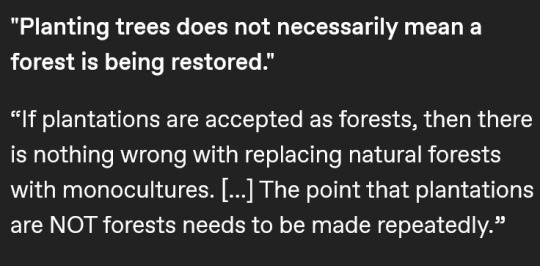
Despite its green image, Ireland has surprisingly little forest. [...] [M]ore than 80% of the island of Ireland was [once] covered in trees. [...] [O]f that 11% of the Republic of Ireland that is [now] forested, the vast majority (9% of the country) is planted with [non-native] spruces like the Sitka spruce [in commercial plantations], a fast growing conifer originally from Alaska which can be harvested after just 15 years. Just 2% of Ireland is covered with native broadleaf trees.
Text by: Martha O’Hagan Luff. “Ireland has lost almost all of its native forests - here’s how to bring them back.” The Conversation. 24 February 2023. [Emphasis added.]
---
[I]ndustrial [...] oil palm plantations [...] have proliferated in tropical regions in many parts of the world, often built at the expense of mangrove and humid forest lands, with the aim to transform them from 'worthless swamp' to agro-industrial complexes [...]. Another clear case [...] comes from the southernmost area in the Colombian Pacific [...]. Here, since the early 1980s, the forest has been destroyed and communities displaced to give way to oil palm plantations. Inexistent in the 1970s, by the mid-1990s they had expanded to over 30,000 hectares. The monotony of the plantation - row after row of palm as far as you can see, a green desert of sorts - replaced the diverse, heterogenous and entangled world of forest and communities.
Text by: Arturo Escobar. "Thinking-Feeling with the Earth: Territorial Struggles and the Ontological Dimension of the Epistemologies of the South." Revista de Antropologia Iberoamericana Volume 11 Issue 1. 2016. [Emphasis added.]
---
But efforts to increase global tree cover to limit climate change have skewed towards erecting plantations of fast-growing trees [...] [because] planting trees can demonstrate results a lot quicker than natural forest restoration. [...] [But] ill-advised tree planting can unleash invasive species [...]. [In India] [t]o maximize how much timber these forests yielded, British foresters planted pines from Europe and North America in extensive plantations in the Himalayan region [...] and introduced acacia trees from Australia [...]. One of these species, wattle (Acacia mearnsii) [...] was planted in [...] the Western Ghats. This area is what scientists all a biodiversity hotspot – a globally rare ecosystem replete with species. Wattle has since become invasive and taken over much of the region’s mountainous grasslands. Similarly, pine has spread over much of the Himalayas and displaced native oak trees while teak has replaced sal, a native hardwood, in central India. Both oak and sal are valued for [...] fertiliser, medicine and oil. Their loss [...] impoverished many [local and Indigenous people]. [...]
India’s national forest policy [...] aims for trees on 33% of the country’s area. Schemes under this policy include plantations consisting of a single species such as eucalyptus or bamboo which grow fast and can increase tree cover quickly, demonstrating success according to this dubious measure. Sometimes these trees are planted in grasslands and other ecosystems where tree cover is naturally low. [...] The success of forest restoration efforts cannot be measured by tree cover alone. The Indian government’s definition of “forest” still encompasses plantations of a single tree species, orchards and even bamboo, which actually belongs to the grass family. This means that biennial forest surveys cannot quantify how much natural forest has been restored, or convey the consequences of displacing native trees with competitive plantation species or identify if these exotic trees have invaded natural grasslands which have then been falsely recorded as restored forests. [...] Planting trees does not necessarily mean a forest is being restored. And reviving ecosystems in which trees are scarce is important too.
Text by: Dhanapal Govindarajulu. "India was a tree planting laboratory for 200 years - here are the results." The Conversation. 10 August 2023. [Emphasis added.]
---
Nations and companies are competing to appropriate the last piece of available “untapped” forest that can provide the most amount of “environmental services.” [...] When British Empire forestry was first established as a disciplinary practice in India, [...] it proscribed private interests and initiated a new system of forest management based on a logic of utilitarian [extraction] [...]. Rather than the actual survival of plants or animals, the goal of this forestry was focused on preventing the exhaustion of resource extraction. [...]
Text by: Daniel Fernandez and Alon Schwabe. "The Offsetted." e-flux Architecture (Positions). November 2013. [Emphasis added.]
---
At first glance, the statistics tell a hopeful story: Chile’s forests are expanding. […] On the ground, however, a different scene plays out: monocultures have replaced diverse natural forests [...]. At the crux of these [...] narratives is the definition of a single word: “forest.” [...] Pinochet’s wave of [...] [laws] included Forest Ordinance 701, passed in 1974, which subsidized the expansion of tree plantations [...] and gave the National Forestry Corporation control of Mapuche lands. This law set in motion an enormous expansion in fiber-farms, which are vast expanses of monoculture plantations Pinus radiata and Eucalyptus species grown for paper manufacturing and timber. [T]hese new plantations replaced native forests […]. According to a recent study in Landscape and Urban Planning, timber plantations expanded by a factor of ten from 1975 to 2007, and now occupy 43 percent of the South-central Chilean landscape. [...] While the confusion surrounding the definition of “forest” may appear to be an issue of semantics, Dr. Francis Putz [...] warns otherwise in a recent review published in Biotropica. […] Monoculture plantations are optimized for a single product, whereas native forests offer [...] water regulation, hosting biodiversity, and building soil fertility. [...][A]ccording to Putz, the distinction between plantations and native forests needs to be made clear. “[...] [A]nd the point that plantations are NOT forests needs to be made repeatedly [...]."
Text by: Julian Moll-Rocek. “When forests aren’t really forests: the high cost of Chile’s tree plantations.” Mongabay. 18 August 2014. [Emphasis added.]
#abolition#ecology#imperial#colonial#landscape#haunted#indigenous#multispecies#interspecies#temporality#carceral geography#plantations#ecologies#tidalectics#intimacies of four continents#archipelagic thinking#caribbean
2K notes
·
View notes
Note
After the events of Transformers: Deviations, how was Optimus Prime able to deal with the Hate Plague without the Matrix Of Leadership?
Dear Anger Appraiser,
In the future of 2005, Optimus Prime and Megatron clashed for what would be the last time. The world was shaped by their deaths, and their subsequent rebirths. You wish to know the future of a world where things happened differently. In a world… where Optimus Prime never died!
It was the young Hot Rod who fell in his stead, sacrificing himself—and the Matrix of Leadership—to defeat the monster planet Unicron. Rodimus Prime never had the chance to lead the Autobots, and never grappled with his shame over Optimus’ death. The Autobot Mausoleum was never constructed. Optimus Prime’s body was never interred there, out of sight, behind the Veil of Remembrance. It was never sent into deep space, and never found by the Quintessons, who never exhumed his corpse, to engineer his dark awakening. The Matrix—destroyed so long ago—never stirred the fleeting remnants of his original personality, never prompting him to turn on the Quintessons. His body was never recovered, never repaired, never set adrift once more. The Hate Plague’s prison-sun never caught him in its gravity. Jessica Morgan never implored Gregory Swofford to help her retrieve Optimus Prime, never bringing them close enough to the eventual supernova to be infected by the hateful spores.
All’s well, it would seem, that ends well.
Unfortunately, fate is rarely so kind. The spores continued on their journey through the vacuum of space for centuries, undisturbed—until a temporo-spatial eddy, formed by two ships chasing each other through transwarp, guided a cloud of spores to a mysterious planet. The Hate Plague infected first the Maximals and Predacons, then all life on Earth—including the Autobots and Decepticons, comatose within the crashed Ark.
When Mount St. Hilary erupted in 1984, the already-infected Transformers awoke to a world where intelligent life had never evolved. They warred with each other ceaselessly, without regard for faction, until their energon reserves ran dry. Earth became a new tomb for the Hate Plague.
Those who had remained behind on the dying Cybertron never heard from their lost leaders again. They could never have imagined Pax Cybertronia uniting their embittered people once more. They never saw Unicron coming, and until their final moments, they never changed. There was no-one to remember Optimus and Megatron, who died at each other’s hands on a hateful alien world, and their names were never honored. The Golden Disk was never stolen—never even tasted by Unicron, never sent by humanity in the first place. The Maximals and Predacons never existed; their ships were never built, never crossed paths with that furious star, never carried the Hate Plague to their ancestors in stasis on that prehistoric world, who would go on to awake in 1984, and begin their war anew. And in the future of 2005, Optimus Prime and Megatron clashed for what would not be the last time. It never ends.
I watched from afar as history repeated itself, ripping scars across that misbegotten universe. Time would bend and yield, and then snap. But for all my power, there was naught I could do to bring closure to this tragedy. For if I was to intervene, I risked becoming infected myself—and by my nature, the Hate Plague would have a vector to spread across all of time and space. And so it lingers now, an infernal engine of suffering, quarantined in a distant corner of the multiverse.
#ask vector prime#transformers#maccadam#deviations#generation 1 cartoon#beast wars#hate plague#optimus prime#megatron#hot rod#autobot mausoleum#veil of remembrance#quintessons#matrix of leadership#jessica morgan#gregory swofford#maximals#predacons#mount st. hilary#unicron#golden disk#pax cybertronia#vector prime#godzillaofwar
41 notes
·
View notes
Text
Guizhong blinks, staring out at the mountainous terrain that was formerly Malphas’ territory.
… Or rather, what remained of the mountainous terrain.
It’s… a mess. The mountains? Are just not there anymore. As in, they’re just completely gone. Vanished! Like they just up and disappeared into thin air!
Now, there’s nothing but a sea of lapping waves stretching out as far as the eye can see, drowning out what used to be perfectly good dry land. There’s no telling how long this unnatural flood will persist, as if the scale of damage wrought to the landscape and environment wasn’t catastrophic enough already.
The flood reached all the way to the borders of the Guili Assembly’s territory. It was only thanks to the defenses that they’d previously put into place that they were able to defend against the sudden onslaught of waves at all. A necessary precaution, given their close proximity to the Lord of the Vortex. But Guizhong hadn’t expected to be putting their adeptal spells and devices to the test so soon.
Looking back on it, the first sign of something amiss had been Lige suddenly spinning around and staring in the direction of Malphas’ territory, stock-still with narrowed eyes. Ever since they formed their alliance, Lige had been slowly shedding that shell of unfeeling stone, but there were still times when his behavior was acutely inhuman.
It had been the startled reports that Guizhong received from their citizens that led her to realize that Lige abruptly left on his own, shedding details of his human form in his haste and scaring quite a few people in his wake. So Guizhong had taken it upon herself to calm their people and get them to settle down again; it was part of their contract.
Lige would be responsible for taking care of martial and warfare-related matters, while Guizhong would be responsible for governance and civil affairs, maximizing both of their strengths in a fruitful partnership.
…
After Guizhong had finished calming their citizens… It hadn’t taken long before she’d sensed the stirrings of battle on the edge of her awareness, in wake of Lige’s departure. But even then, she’d been confident that her fellow god had things well in hand.
… Which was before the water level had started rising rapidly at an alarming rate, forcing Guizhong to hurriedly rally together the other adepti to put their protective measures into play, in order to protect the Guili Assembly. It was only after the water started receding and Guizhong was sure that the adepti could hold down the fort that she’d left their territory and followed after Lige’s trail.
Which led to where she was right now: Flying above the waves, and trying to make sense of what was going on.
“Just what in the world happened here?” Guizhong mutters to herself, frowning.
The waves below her remain silent, and do not yield any answer besides the obvious: That a cataclysmic battle had taken place between gods here, and this was the terrifying result.
The goddess closes her eyes briefly, silently mourning over the many innocents who were caught up in this conflict through no fault of their own.
Malphas’ people… while Guizhong held no love for Malphas, who treated humans more like playthings and curiosities than actual people to be cherished for their individuality–
The humans who lived in Malphas’ territory didn’t deserve such a fate, drowned in a watery grave that had no business flooding the land like this.
If this was Osial’s work… then the Lord of the Vortex had much to answer for. Guizhong was sure that Lige would agree with her, and he definitely wouldn’t be the only god to do so.
Speaking of–
Guizhong holds out her hand, where a Geo crystalfly alights gently on her fingertip, tingling with a familiar energy signature. The crystalfly flaps its wings, then lifts up into the air again –and begins flying in a very specific direction.
Follow.
“You’d better have a good explanation for all of this, Lige,” she mutters under her breath.
While Lige is not one to shy away from battle, he is not one for meaningless, wanton destruction, laying waste to anything and everything around him. Guizhong trusts that he wouldn’t have intentionally caused such destruction, but if he had really been pushed to this extent by Osial, then… the Lord of the Vortex was far more dangerous than either of them had suspected.
Concern rises in her chest, coupled with worry and anxiety for her partner.
The emotions do not abate until she finally catches sight of him again. Lige looks… definitely more roughed up than Guizhong remembers seeing him this morning. And he’s also injured, with a particularly serious gash torn diagonally across his chest, still bleeding heavily –even though his expression remains passive and unchanging, as if he doesn’t feel the pain at all.
But Guizhong does.
Tears spring to her eyes, “Lige!”
The Geo crystalfly that had led her to him lands on the other god’s shoulder. Lige blinks, some measure of awareness returning to his eyes and easing his stone visage… and he nods in her direction, relaxing slightly at the sight of an ally. “Guizhong. You’re here.”
“Of course I am!” Had he expected otherwise? Just because Guizhong wasn’t a god who was suited for combat didn’t mean that she couldn’t fight. “What in the world happened, Lige? Is this Osial’s work? Should we be expecting an invasion?”
“An invasion…” Lige mutters, amber eyes hardening. “It is possible. Although it won’t be happening for quite some time, I’d imagine.”
Guizhong frowns. “Are you certain?”
“Yes,” Lige nods. Then, in that infuriatingly unchanging cadence of his, “He just lost five of his six heads. I’d be surprised if he regains enough strength to lead an invasion and wage war anytime soon.”
The Lord of the Vortex is one of the oldest gods! One of the most powerful Hydro gods on this side of the ocean! And he just–?
Guizhong gapes at him, “You–?!”
Lige shakes his head. “I claimed two heads. The other three were her work.”
And so saying, the god gestures to the side. At this point, Guizhong finally focuses on the others who’d also been present this entire time –a heavily injured bird spirit who watches the two of them separately, clutching tightly onto an unconscious girl in his arms.
No, not just a girl. That was… another god?
The bird spirit shifts uneasily under Guizhong’s attention. Were it not for his wings being all but shredded, she has no doubt that he would’ve taken flight perhaps the very instant that she’d arrived–
“There’s no place for you and your new god to go to even if you run,” Lige says. “Osial may have been dealt a grievous blow, but his armies remain. His influence stretches wherever the water reaches, and it will be quite some time before the waves subside. You’ll only be endangering the both of you, if you run.”
The bird spirit says nothing in response.
“We’re not going to hurt you,” Guizhong says gently, crouching down to the young spirit’s height. Lige’s words might be a little scary, but Guizhong can read him well enough by this point to know that he’s legitimately concerned for these two. “Let us help you and your god, please?”
The bird spirit still says nothing. But his gaze wavers, flickering between them and the bloodied god that he clutches in his arms.
“I promise that we will not harm you or your god. Come with us to the Guili Assembly, and we will get you treated,” Guizhong tells him. Then, reaching out a hand and pointing towards Lige, “You know who he is, right?”
“… The Groundbreaker.”
“That’s right,” Guizhong says encouragingly. “He’s also the God of Contracts. So if I make a promise before the God of Contracts, then know that my words can be trusted, and that I will not act in bad faith to you or your god, alright?”
#writing#zenith of stars au#guili au#lige is the name we're using for zhongli here#because he is not yet zhongli haha#guili comes from guizhong's “gui”#and “li” is from the name that zhongli used at the time#so here it's lige hahaha#special thanks to ko-fi friends!
113 notes
·
View notes
Link
Maximize yields with the best LED grow lights for hydroponics and give your plants the light they need to flourish in any environment.
0 notes
Text
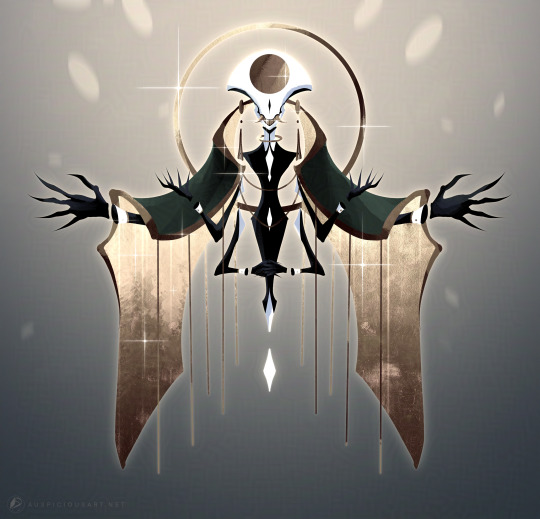

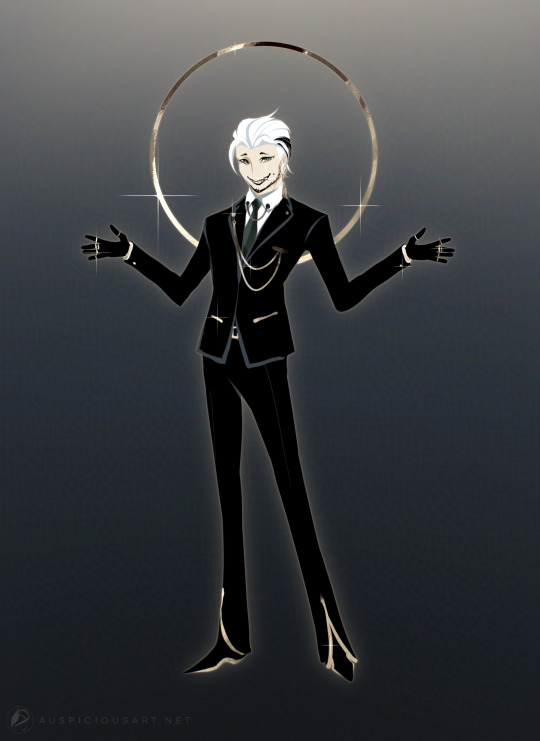


Profit (he/they/any), an Edeia representing the Idea of Profit.
This all started with me having a silly thought of using the name "Rob Banks" based on a video I saw...
Edeia Site | Edeia Discord | Personal Website
Profit
"Everyone should profit. But of course, I should profit the most."
At present, Profit is charismatic and persuasive, creating mutually beneficial arrangements where they still came out ahead. They became more patient, willing to invest in long-term growth rather than immediate exploitation. Profit developed genuine curiosity about innovation and began to enjoy watching their investments flourish. Their demeanor was often inviting, rather than threatening, though they always carried an undertone of calculation with them. At present, he is more forthright about his profit motives, but he is more honest about his practices and always follows through on his promises to partners.
He has quite the sense of humor, though he cares more about what's amusing to him than what's amusing to others. So long as there's no real harm, he delights in others' ruffled feathers (for instance, by making puns). He enjoys peppering his speech with business jargon, often for humorous effect, but avoids using it so excessively that others can't understand him.
While still fundamentally self-interested, Profit now values sustainable profit over destructive exploitation, understanding that a healthy economic ecosystem yields greater returns than a series of depleted targets. He creates transparent but advantageous deals where all parties benefit—though, of course, he benefits the most. He considers himself an investor, finding promising individuals and ventures to provide all sorts of resources, with the intention of getting a return in the future. He does still participate in black markets and corruption, but only when it generates new growth and value—not when it simply transfers opportunity from one individual to another.
Abilities
Market Intelligence
Profit can sense untapped value and potential profit in people, places, objects, and situations. He also has an innate awareness of past and current market trends, as well as a predictive sense for future market movements. This ability can be temporarily granted to others as an intuitive sense for good deals and profitable ventures.
Seed Capital
Profit can create one "whole unit" (e.g. 1 USD, 1 bitcoin, etc.) of any currency that exists in his current dimension, so long as he has any amount of information on its existence, if he does not own any physically or in assets.
Binding Proposition
Profit can create magically binding contracts for deals involving currency or valued assets. These contracts cannot be broken by conventional means and ensure that all parties fulfill their obligations or pay the penalties agreed upon.
Portfolio Diversification
Profit can maintain countless business ventures, investments, and assets across multiple dimensions simultaneously without loss of oversight or control. This allows them to spread risk and maximize returns by operating in various economies with different rules and growth patterns. They can mentally "check in" on any of their ventures at will.
Return on Investment
After investing time, energy, or resources into a person or venture, Profit is guaranteed some form of return. This doesn't guarantee success, but it does mean that even failures will yield valuable lessons, connections, or alternative opportunities that can be monetized in some way. Nothing Profit invests is ever truly lost. This is a passive ability, but Profit can focus to apply it to others, guaranteeing a "return" for those individuals.
Asset Empowerment
Profit can designate individuals as "Associates" through magical contracts, granting them enhanced abilities related to their role in Profit's ventures. These enhancements are tied to performance conditions and limitations:
Associates must share a percentage of all gains with Profit.
They cannot act against Profit's interests.
Their abilities cannot be used for unauthorized ventures.
The magic enforces compliance, with abilities failing or backfiring if terms are violated.
Successful Associates may see their capabilities grow over time, creating a mutually beneficial relationship while allowing Profit to extend their influence through a network of empowered agents across markets and dimensions.
Abstraction
Profit's original Abstraction took the form of a large building of countless rooms, filled with all sorts of things. After those were lost in Profit's transition to the Main Continuity, that building was rebuilt alongside a sprawling, glittering city of modern skyscrapers and glass buildings. The sky is in an eternal golden twilight. Streams of gold light pour from the sky in straight lines, and the air is filled with glittering gold particles.
The city, referred to as Gold, is inhabited by residents from all across Ideation and other dimensions, including humans and non-humans. Every resident is in the pursuit of profit, though they are more cooperative than competitive. There are corporations and small businesses, artists and consultants—any occupation, any role, so long as they hold a doctrine of "profit for all, profit for Profit" in their hearts.
Time is strange and nonlinear—those who need more time will have more time, and those who wish for time to pass faster will experience time passing faster. Those who wish to rest can rest as long as they like, and still be on time for work. In some cases, some will be able to be present in multiple places at once or step back in time to remedy a mistake, though this requires authorization from Associates that handle governance of the city. Associates can also authorize a "storefront," which involves that business merging a door, room, or other part of their venture with a physical location to interact with united society or extradimensional societies.
Gold is considered an independent magical society by united society.
Story Synposis
Profit began as Robert "Rob" Banks in the Calamity Continuity, where he rose from a business prodigy to become a ruthless financial mastermind who eventually gained control of the nation of Adamant. As reality began crumbling around him—partially due to his own exploitative tactics—Profit faced the meaninglessness of his accumulated wealth and power. Given a second chance by Possibility, he abandoned his Abstraction's contents and transferred to the Main Continuity in 1805, where he embraced a more sustainable approach to wealth creation. In this new timeline, Profit established himself as "the Prophet of Profit," building ventures across magical and mundane societies while creating a golden city in his Abstraction for those who shared his values of "profit for all, profit for Profit."
For more, see his profile.
41 notes
·
View notes
Text
Excerpt from this Op-Ed from the New York Times:
At first glance, Xi Jinping seems to have lost the plot.
China’s president appears to be smothering the entrepreneurial dynamism that allowed his country to crawl out of poverty and become the factory of the world. He has brushed aside Deng Xiaoping’s maxim “To get rich is glorious” in favor of centralized planning and Communist-sounding slogans like “ecological civilization” and “new, quality productive forces,” which have prompted predictions of the end of China’s economic miracle.
But Mr. Xi is, in fact, making a decades-long bet that China can dominate the global transition to green energy, with his one-party state acting as the driving force in a way that free markets cannot or will not. His ultimate goal is not just to address one of humanity’s most urgent problems — climate change — but also to position China as the global savior in the process.
It has already begun. In recent years, the transition away from fossil fuels has become Mr. Xi’s mantra and the common thread in China’s industrial policies. It’s yielding results: China is now the world’s leading manufacturer of climate-friendly technologies, such as solar panels, batteries and electric vehicles. Last year the energy transition was China’s single biggest driver of overall investment and economic growth, making it the first large economy to achieve that.
This raises an important question for the United States and all of humanity: Is Mr. Xi right? Is a state-directed system like China’s better positioned to solve a generational crisis like climate change, or is a decentralized market approach — i.e., the American way — the answer?
How this plays out could have serious implications for American power and influence.
Look at what happened in the early 20th century, when fascism posed a global threat. America entered the fight late, but with its industrial power — the arsenal of democracy — it emerged on top. Whoever unlocks the door inherits the kingdom, and the United States set about building a new architecture of trade and international relations. The era of American dominance began.
Climate change is, similarly, a global problem, one that threatens our species and the world’s biodiversity. Where do Brazil, Pakistan, Indonesia and other large developing nations that are already grappling with the effects of climate change find their solutions? It will be in technologies that offer an affordable path to decarbonization, and so far, it’s China that is providing most of the solar panels, electric cars and more. China’s exports, increasingly led by green technology, are booming, and much of the growth involves exports to developing countries.
From the American neoliberal economic viewpoint, a state-led push like this might seem illegitimate or even unfair. The state, with its subsidies and political directives, is making decisions that are better left to the markets, the thinking goes.
But China’s leaders have their own calculations, which prioritize stability decades from now over shareholder returns today. Chinese history is littered with dynasties that fell because of famines, floods or failures to adapt to new realities. The Chinese Communist Party’s centrally planned system values constant struggle for its own sake, and today’s struggle is against climate change. China received a frightening reminder of this in 2022, when vast areas of the country baked for weeks under a record heat wave that dried up rivers, withered crops and was blamed for several heatstroke deaths.
145 notes
·
View notes
Text
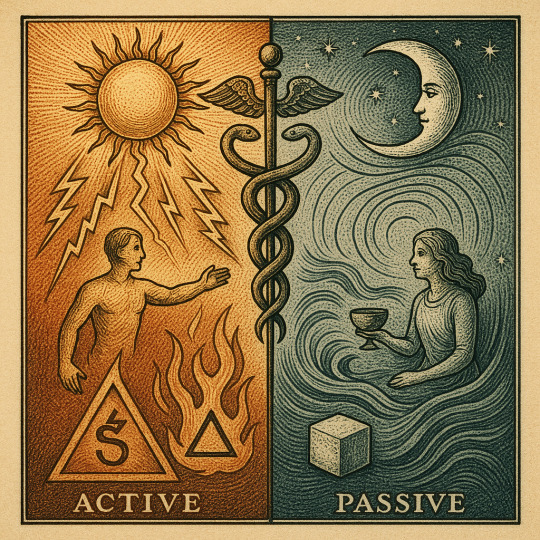


Active is Electric, Passive is Magnetic
In working with these energies, nearly every system diagrams a right-left or solar–lunar pair of conduits. The work is to move force through the active line until it arcs across and is received by the passive line, completing a loop that feeds back on itself.
Electric activity is repeatedly illustrated as heat, light, or sulfurous vapor that rises.
Magnetic receptivity appears as moisture, moon-milk, or salt crystal that condenses.
Fusion of the two yields a third substance—kundalinī bliss, white/red thig le, golden elixir or philosophical stone.
Tantric maithuna, Taoist dual cultivation, and the alchemic “chemical wedding” all literalise the polarity as masculine emissive seed meeting feminine fertile ground—yet the texts insist the real drama is internal and androgynous.
In each lineage the maxim “Solve (electric) → Coagula (magnetic)” is iterated. Every successful coagulation becomes the new body that a stronger current can again dissolve—an upward spiral.
See also:
The Rebis.
Queen and King.
The Union of Opposites.
25 notes
·
View notes
Note
Oh, come on, I was going to reblog that. I was turning the science off in my brain for this episode, and then she slammed that "antiviral" into the rat, and I had to remove my brain cells entirely.
LOL sorry! The post I deleted was another "frustrated scientist" post about how viruses don't have antidotes. Antidotes are for poisons and other toxic substances.
But it's not like Hollywood has a great track record of depicting realistic science. I usually assume they won't.
Like the bane of my existence is those endless scenes in various shows and films where the cure for some disease is the MacGuffiny "formula" that the hero has to find (we don't call those "formulas" but that's beside the point). Then when they find the formula they treat it like a recipe? Like you mix together a few bench chemicals and voila, here's your cure?
THAT'S NOT HOW THAT WORKS.
ok you got me going now, i'm off to the races.
So.
A lot of synthetic targets that are bioactive are small molecule inhibitors, especially when we're talking about cancer drugs. Here's an example:
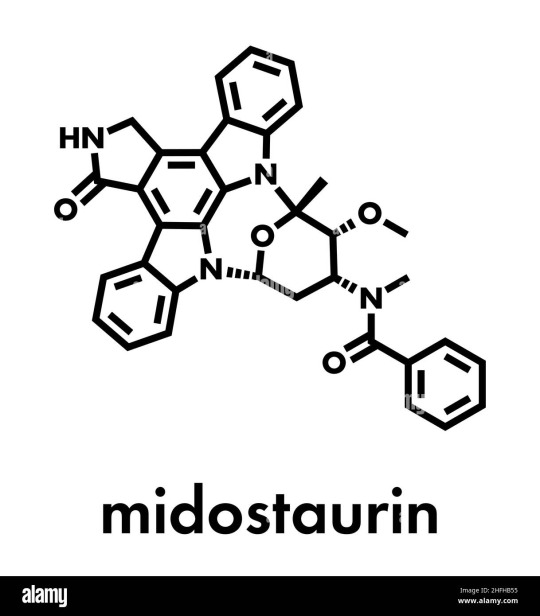
It's a protein kinase inhibitor used to treat acute myeloid leukemia.
This may be a small molecule but synthetically it's fairly complex, and it's also stereogenic (it has distinct 3D structure components that are hard to separate from each other).
This is not something you isolate from tree bark or something. This is something you design and synthesize.
So imagine that if your final step is this molecule, and your first step is "stuff I can buy from the chemical catalog," there will be X number of steps in between.
I haven't seen the total synthetic scheme for midostaurin but if it's less than 30 steps I'd be shocked.
And when you're developing this scheme, each step has to be optimized (meaning tried under various reaction conditions to maximize yields) before you can move on to the next one. And you might find out that one of your proposed steps doesn't work at all, so you have to backtrack.
Each of these 30 steps, you only get a certain percent yield. So you can start with pounds of starting material and wind up with like 5 milligrams, if you're lucky.
This is the work of years, probably. This is what grad students do all day long, optimize steps and repeat them fifty times.
Formula. Bah.
27 notes
·
View notes